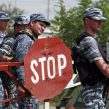
Ingushetia’s Islamists Adopt Nationalist Rhetoric
Publication: Eurasia Daily Monitor Volume: 7 Issue: 181
By:

On October 4, the Ingush sector of the North Caucasian Islamic insurgency announced a drastic change in tactics. The insurgents declared in a videotaped statement they would temporarily cease attacks against Ingushetia’s law enforcement personnel, although reiterated that local informants who corroborate with the Russian security services would still be subject to retribution. The insurgents repeatedly urged the Ingush people to pray for them and not to betray them to the Russian authorities. The statement also contained a strong nationalistic message, accusing the neighboring Ossetian people of being the source of majority of Ingush people’s problems. The statement vowed to attack Ossetians and to reclaim the disputed Ingush land that is held by North Ossetia (www.hunafa.info, October 5).
Earlier, on September 29, the head of Ingushetia, Yunus-bek Yevkurov, stated that all leaders of the insurgency in Ingushetia had been eliminated and that this had slightly helped to improve the security situation in the republic. Yevkurov attributed this success to the increased presence of the Russian security services in the republic. He cautioned that the relative stability was still precarious and fully dependent on the large influx of Russian law enforcement personnel (www.vestikavkaza.ru, September 29).
Previously, describing the security situation in Ingushetia, the republic’s prosecutor-general, Yuri Turygin, said that 49 insurgents were killed and 32 arrested in Ingushetia in January through August 2010. Turygin estimated the number of casualties among the police forces at 21 and the number of wounded at 108. Seven civilians were killed and 36 injured in the fighting (www.ingushetiyaru.org, September 3)
On June 9, the Russian security services arrested Emir Magas (aka Ali Taziev), the leader of Ingushetia’s rebels. The Federal Security Service (FSB) trumpeted the arrest as a great success, as Magas was considered to be among the top military leaders in all of the North Caucasus armed underground movement. The arrest of an insurgent leader surprised many observers, as the Russian security services had never arrested insurgent leaders before, but had simply killed them on the spot.
The insurgency in tiny Ingushetia, with its population of a half-million people, was considered to be among the strongest in the North Caucasus, but over the past one to two months violence in the republic seems to be waning. This impression may prove to be wrong, however, if the younger and probably more ruthless generation of insurgents in Ingushetia starts to target civilians in neighboring North Ossetia rather than policemen and officials in Ingushetia. On September 9, a suicide bomber from Ingushetia exploded his bomb by a market place in Vladikavkaz, North Ossetia, killing 19 people and injuring over 200 others. This terrorist attack evoked unusually fierce reaction from the Ossetian population. In the aftermath of the attack, crowds of Ossetian youth demanded the resignation of the North Ossetian government and marched through an Ingush settlement in the republic near Vladikavkaz.
The leaders of the Ingush insurgency may have decided that inciting an inter-ethnic conflict between the Ingush and the Ossetians may serve their purposes better than mere attacks on policemen and officials.
The latest statement by the Ingush insurgency mentioned that the insurgents had trained militants to strike the Ossetians specifically. It is unknown, however, whether the statement referred to the suicide attack on September 9, or to future attacks, or to both. There are clear signs the shooting of the video statement took place at the end of August or beginning of September. It was posted on YouTube on October 4 and is entirely in Ingush. The insurgents’ website Hunafa.info translated it into Russian and published the transcript. The video features a dozen young armed men, two of them holding a slogan in what looks to be Arabic. All of the men have their faces covered and only one of them speaks.
The Ingush sector of insurgency may be going through a complicated period as it tries to redefine its role after having lost several of its leaders. The latest statement was made by a nameless Ingushetia’s cadi (Islamic judge). However, as Yunus-bek Yevkurov himself pointed out, the rebel movement in the republic had been reduced only by a small measure. More importantly, the Ingush insurgents, despite their Islamism, position themselves as Ingush patriots who will fight for the Ingush lands that were handed over to North Ossetia. This stance might add to their popularity with the Ingush people, especially given that even some Ingush officials criticized Yevkurov for making a friendly visit to South Ossetia in September.
Ingushetia and North Ossetia have had rocky relations since the conflict in 1992 over disputed territory on their administrative border. This border belonged to Ingushetia before it was transferred to North Ossetia. The conflict left thousands of families homeless – mostly Ingush who were driven out of North Ossetia. Many of the Ingush refugees have returned to North Ossetia since then, but the disputed land issue is still a hotly contested topic in Ingushetia and North Ossetia. By framing their goal as the fight for recovering Ingush lands in North Ossetia, the insurgents might help to improve the security situation inside Ingushetia but marginalize Yunus-bek Yevkurov. At the same time, it is likely to jeopardize the already precarious inter-ethnic relations between the Ingush and the Ossetians.
On October 6, the head of Russia’s Security Council, Nikolai Patrushev, accused unspecified foreign forces of being behind the latest explosions in the North Caucasus, including the attacks in Vladikavkaz, Pyatigorsk and Stavropol (www.kavkaz-uzel.ru, October 6). Patrushev, who previously headed the FSB, has frequently accused foreigners of meddling in the North Caucasus without providing evidence. Such largely baseless claims will do nothing to lessen the increasing likelihood of inter-ethnic clashes in the North Caucasus.




